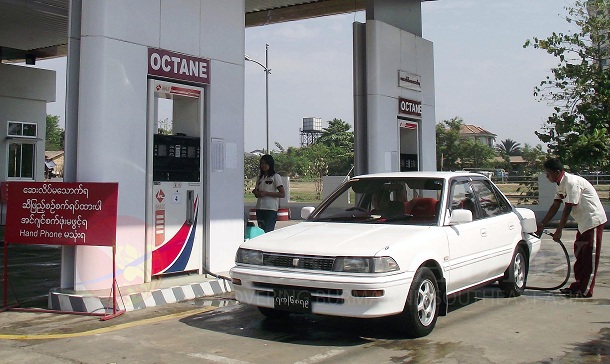NAYPYIDAW — The privatization of almost 250 state-owned gas stations in 2010 will be investigated, a lawmaker from the Upper House of Parliament told The Irrawaddy recently.
MP Phone Myint Aung said the previous military regime sold 247 gas stations at very low prices to private companies and the ruling Union Solidarity and Development Party (USDP), and the lawmaker vowed to do whatever he could to find out how it happened.
Those stations, run by the Ministry of Energy, were transferred in March 2010 to the military-owned Myawaddy Trading Ltd., the USDP and companies with close ties to generals, such as Max Myanmar, Htoo Trading, Ayar Shwe War, IGE, Nilar Yoma, Loi Hein and Shwe Taung.
According to Phone Myint Aung, most of the stations were sold for only tens of millions of kyat or less, well below their market value.
“I asked the currently responsible ministry the selling prices of the 247 gas stations because I heard that they were surreptitiously sold to the private sector, and found [the case to be] as I had been informed,” the MP said.
“The move really affected public finances, since those stations belonged to the people. It needs to be investigated and I, as an MP, will use all my power to retrieve the public’s treasure,” he said.
The Ministry of National Planning and Economic Development has stated that the former military regime earned about 9.24 billion kyat (US $10,545,000) from the sale of the 247 gas stations.
“In Rangoon, just the land the stations are located on is worth billions of kyat, but they were sold for only a fraction of that,” continued Phone Myint Aung.
“For instance, the gas station located next to Aung San Suu Kyi’s house on University Avenue St. was transferred to Myawaddy Trading for 96.125 million kyat, and another one located beside Inya Lake was sold for 391.354 million kyat. In fact, they’re worth billions,” he explained.
USDP Vice Chairman Htay Oo, however, argued that his party had acquired 19 stations at prices set by the government.
“Back then, there was a committee that took care of selling public property to the private sector and we bought those stations with the committee’s set prices,” Htay Oo said. “It didn’t reduce the price for us alone. Everyone involved in the transfer was given discounts since the government encouraged the opening of private gas stations.”
Dr Maung Maung Soe, a retired professor from the Faculty of Economics at Rangoon’s University of Distance Education, said the privatization of public property at very low prices must be investigated.
“It really has a huge impact on the country and the people,” stressed the professor.
“A system that lacks transparency and competition and works in favor of people close to each other should be investigated. Necessary actions should be taken, too, if we are actually marching toward a democratic system. Instead of the very cheap prices they were granted, buyers should now also think about giving fair prices for those stations,” he added.

















